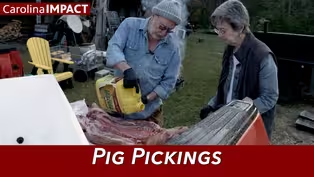
Alzheimer’s Disease Care
Clip: Season 12 Episode 1208 | 5m 57sVideo has Closed Captions
Caring for a loved one with Alzheimer’s can be tough, see how the journey can be easier.
We all likely know someone who has Alzheimer’s. In North Carolina specifically, more than 210,000 people are living with the disease. But did you know over 373,000 loved ones are providing care for them? According to the Alzheimer’s Association, as symptoms worsen, caregivers can face depression and anxiety. Here’s an inside look at the selfless journey of two local caregivers.
Problems playing video? | Closed Captioning Feedback
Problems playing video? | Closed Captioning Feedback
Carolina Impact is a local public television program presented by PBS Charlotte

Alzheimer’s Disease Care
Clip: Season 12 Episode 1208 | 5m 57sVideo has Closed Captions
We all likely know someone who has Alzheimer’s. In North Carolina specifically, more than 210,000 people are living with the disease. But did you know over 373,000 loved ones are providing care for them? According to the Alzheimer’s Association, as symptoms worsen, caregivers can face depression and anxiety. Here’s an inside look at the selfless journey of two local caregivers.
Problems playing video? | Closed Captioning Feedback
How to Watch Carolina Impact
Carolina Impact is available to stream on pbs.org and the free PBS App, available on iPhone, Apple TV, Android TV, Android smartphones, Amazon Fire TV, Amazon Fire Tablet, Roku, Samsung Smart TV, and Vizio.

Introducing PBS Charlotte Passport
Now you can stream more of your favorite PBS shows including Masterpiece, NOVA, Nature, Great British Baking Show and many more — online and in the PBS Video app.Providing Support for PBS.org
Learn Moreabout PBS online sponsorship- [Dara] Moments like this with her family.
- I'm a creature of habit.
- [Dara] Bonding and putting together puzzles.
- I like a dark green.
- [Dara] Means so much more to Debbie Teague these days.
- I know.
- [Dara] She holds onto every bit of joy she feels in her heart because she knows there's a possibility she won't remember it in the future.
- And then I get teary because I can't figure out what I'm wanting to say and I'd get frustrated with myself.
- [Dara] The 65-year-old was diagnosed with younger onset Alzheimer's disease a little over a year ago.
It impacts her memory as well as her communication.
- He will see me and I'm not, can't figure something out.
And he said, "What are you trying to do?"
"I don't know."
And he'll say something and it pops in my head and I say, "That's it."
- [Dara] Her husband Marc of 46 years remains by her side.
He's taking on more household chores, keeping her encouraged, and coming to terms with their new reality.
- Just accepting that she, I don't know if I can get this out but that she does have Alzheimer's.
And life is not the way it used to be, you know?
It's changed, and it's scary what might lie ahead.
- [Dara] Before Debbie was diagnosed, the couple's two daughters begin to notice changes like her misplacing items, forgetting things and repeating herself.
These are all signs medical experts say people should take seriously.
- If someone has early signs of something like Alzheimer's disease or even a condition that precedes Alzheimer's disease called mild cognitive impairment, it is so important for them to be seen because we have medications that are available to slow down the progression of Alzheimer's disease.
- [Dara] According to the Alzheimer's Association, nearly 7 million Americans are dealing with the disease caused by complex brain changes after cell damage.
It affects thinking, behavior, and memory and worsens over time and can have major impacts on daily activities.
- The rates of Alzheimer's in America, even here in North Carolina, will arise mostly because of risk factors: heart health, diabetes, cholesterol, blood pressure.
- [Dara] Research shows that older African Americans are twice as likely as older whites to have Alzheimer's or other forms of dementia.
Among African Americans 70 and older, 21.3% are living with Alzheimer's.
Neurologist Robert Wiggens explains a possible cause.
- One thought is that it may be related to these modifiable risk factors.
So whether people are more likely to have things like diabetes, blood pressure issues, cholesterol.
- [Dara] Wiggins says factor can be socioeconomic status, which impacts people's access to healthy food, education, and doctor's visits.
Fortunately, 89-year-old Xxere Perry's daughter recognized something was wrong with her father seven years ago.
- So my dad started presenting with tremors, and I knew those tremors because my grandfather had tremors.
And so I kind of knew that kind of what he was dealing with even before we got the official diagnosis.
- The diagnosis turned out to be Alzheimer's related to Parkinson's disease, which is a movement disorder of the nervous system that can cause tremors.
Tanya Blanding immediately became her father's caregiver, helping him with daily tasks like preparing medications and cooking.
- I always remember what he did for me when I was young, so I try to keep that as a mindset as I'm caring for him now.
I wanna give him the same love and attention that he gave me as a young person.
- [Xxere] That my booboo.
- [Dara] And Xxere has a furry friend looking after him too.
- She's definitely a companion to my dad.
She watches out for him.
She knows what her assignment is.
If she feels that he's not feeling well, she'll come and get me and she's on her job.
- When she first came, I said, "She's going to sleep out there," because I didn't want no dog in the house.
Now, I can't do without that mutt.
- [Dara] He can't do without his daughter either.
- She's a loving person to be with, and I enjoy her very much and I love her.
- [Dara] Doctors tell us for those like Tanya taking on the tough role of caregiving, it's critical to make sure they don't neglect themselves and truly lean into their support system.
- You're on the same team, not only with the person you love, the person you're providing care for, but also your doctors, the nurses.
This can be a very difficult disease to not only treat, but also to care for.
So it's really important just to know who your teammates are.
- [Dara] And even though it's a challenging disease, there's still hope.
- The landscape previously in Alzheimer's disease was really focused on what we call symptomatic therapy or symptomatic treatment.
What that was, was mostly what I call like an oil change.
It might make someone feel a little bit better, but it really wasn't having an impact on the progression or the worsening of Alzheimer's disease.
Things now, though, are dramatically different.
We have several approved medications.
- [Dara] Two of those are lecanemab and donanemab.
These medications have proven to slow the progression of the disease.
As research continues to evolve, it gives families more time to make precious memories that patients may not remember, but those closest to them certainly will.
For "Carolina Impact," I'm Dara Khaalid.
Video has Closed Captions
Clip: S12 Ep1208 | 6m 17s | Do Greater Charlotte empowers Charlotte area kids to learn about the world of creativity. (6m 17s)
November 26th, 2024 Preview | Carolina Impact
Preview: S12 Ep1208 | 30s | Do Greater Charlotte, Alzheimer’s Disease Care, Pig Pickings, & Wolly McNair Graphic Artist (30s)
Video has Closed Captions
Clip: S12 Ep1208 | 5m 2s | Meet Dan the Pig Man and learn about the tradition of whole hog barbecue. (5m 2s)
Video has Closed Captions
Clip: S12 Ep1208 | 5m 3s | Meet Wolly McNair, a graphic novel illustrator, freelance artist and mentor to young people (5m 3s)
Providing Support for PBS.org
Learn Moreabout PBS online sponsorship
- News and Public Affairs

Top journalists deliver compelling original analysis of the hour's headlines.

- News and Public Affairs

FRONTLINE is investigative journalism that questions, explains and changes our world.












Support for PBS provided by:
Carolina Impact is a local public television program presented by PBS Charlotte



